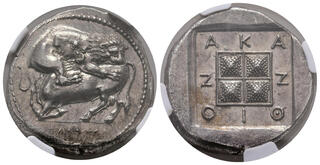| Savoca Numismatik GmbH & Co. KG > Online Auction 193 | Silver | Auction date: 28 January 2024 |
| Lot number: 5 Price realized: 10,000 EUR (Approx. 10,832 USD) Note: Prices do not include buyer's fees. | Show similar lots on CoinArchives Find similar lots in upcoming auctions on |
| Lot description: Macedon. Akanthos circa 380-350 BC. Struck under the magistrate Alexios Tetradrachm AR 26 mm, 14,24 g ΑΛΕΞΙOΣ, Lion to right, attacking a bull collapsing to left with head raised / ΑΚΑΝΘΙΟΝ, raised quadripartite square surrounded by inscription; all within shallow incuse square. NGC graded Ch AU Strike 5/5 Surface 5/5 / Brilliant lustrous mirror like surfaces Cf. Desneux 150 (unrecorded dies but reverse close to R135); HGC 3.1, 391; SNG ANS -; Tselekas, Period G, 392 var. (O332/R-). Ex Nomos AG, Auction 28, lot 1149 (11.000 CHF) Akanthos stands as an intriguing chapter in the history of ancient Greece. Situated in the northern region of Greece, specifically on the Chalcidice Peninsula, this city was founded by Greek settlers, potentially originating from the island of Andros, in the 7th century BC. Its strategic location on the northern Aegean coast allowed it to flourish and engage in both trade and cultural exchange with neighboring Thracian tribes. This unique blend of Greek and Thracian influences was reflected in the city's culture and art. As part of the broader wave of Greek colonial expansion, Akanthos established itself as a thriving city that had connections with other Greek colonies along the Mediterranean and Black Seas. Its participation in the Greco-Persian Wars during the early 5th century BCE solidified its significance, with Akanthos contributing to the efforts of Greek city-states fighting against the Persian Empire. Akanthos also maintained relations with the formidable city-state of Athens and was a member of the Delian League, an alliance formed for mutual defense against the Persian Empire. However, the city's history was marked by periods of conflict with neighboring city-states like Olynthus and external threats, notably from Philip II of Macedon. Over time, Akanthos experienced a gradual decline, and by the Roman era, its once-prominent status had waned. Today, the archaeological site of Akanthos preserves remnants of its city walls, buildings, and necropolis, providing valuable insights into the dynamic history and culture of ancient Greek settlements in the northern Aegean region. Starting price: 10000 EUR |  |


